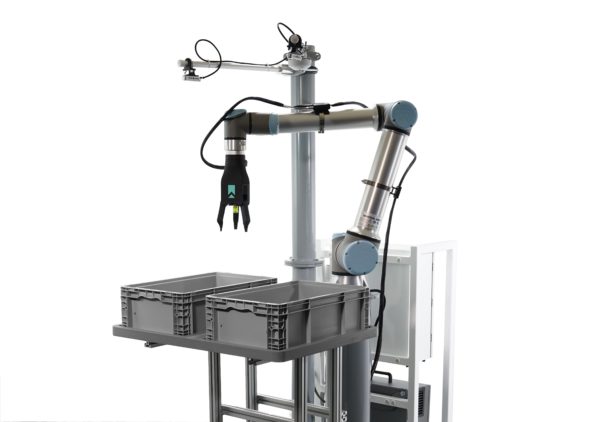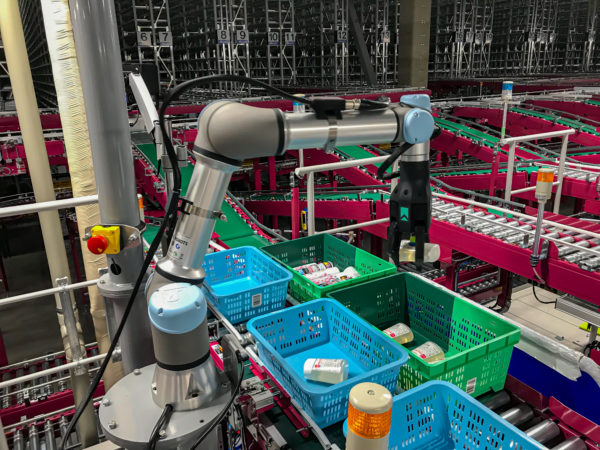 Eileen Mozinski Schmidt
Eileen Mozinski Schmidt As e-commerce grows, automation and artificial intelligence help companies keep pace
Recent months, and the last holiday season, in particular, brought an e-commerce boom like no other. As the pandemic accelerated trends already in motion, online shopping and deliveries exploded and possibilities surrounding automation and artificial intelligence zoomed to the forefront. Now as businesses consider the changing landscape, the use of automation and AI are weaving more tightly into the practices of many operations.
A Permanent Shift
At DHL Supply Chain, Kraig Foreman said the shifts that occurred in shopping patterns during the pandemic are here to stay. “It’s not a temporary change,” said Foreman, President, eCommerce, DHL Supply Chain, North America, of the rapidly rising levels of online shopping and home delivery. While such patterns were increasing before the pandemic, Foreman said that March and April of 2020 contained a big e-commerce spike coinciding with the spread of the coronavirus.
The subsequent 2020 holiday season also presented major increased demand for e-commerce and delivery. At DHL, Foreman reported a “very successful peak season.” “There was a lot of work and effort in the industry to make it successful. Parcel carriers did a great job. I think retailers did smart things in bringing in promotions early, before Black Friday,” he said. “Overall, the industry did a great job considering the unprecedented level of volume.”
The need for additional labor was apparent, however, both over the holidays and currently. “The more (e-commerce) expands, the more labor we’re going to need. That is where technology is going to be important,” Foreman said. Technology can help fill gaps, but Foreman added that businesses will also need to hone their appeals for workers. “When a shortage exists, as an employer in the market you have to win the contest for labor,” he said, noting this is something DHL has remained focused on – building a work environment and culture appealing to workers.
Also important is “getting technology into our businesses that help reduce some of the burdens and also make the work content more appealing,” Foreman said. There are a host of growing areas in both automation and artificial intelligence that Foreman said is exciting for the industry, like advancing analytics. “That’s a big game-changer for the industry,” he said. “It is changing from us looking through the rearview mirror to looking through the windshield,” he said. Foreman also mentioned advancements in robotics as part of the new landscape, including picking robots.
Robots Lend a Hand
This is an area focused on at RightHand Robotics. “We are building data-driven, intelligent picking platforms useful for predictable order fulfillment,” said Vince Martinelli, head of product and marketing for the company. He noted the frequent number of points during the e-commerce process when a product needs to be handled. If robotics can help at some of those points, then he said the process can be streamlined.
 Picking automation has developed beyond what was envisioned even as recently as a decade ago, according to Martinelli, aided by the advancement of cameras. Cameras are cheaper and can now perceive depth, allowing a robot to be equipped to sort items from a pile. “This machine learning that has emerged in the last eight years that makes it such that you can teach and train systems to do cognitive tasks,” said Martinelli, who added that the advancement of gaming technology and related products have also translated to the material handling world.
Picking automation has developed beyond what was envisioned even as recently as a decade ago, according to Martinelli, aided by the advancement of cameras. Cameras are cheaper and can now perceive depth, allowing a robot to be equipped to sort items from a pile. “This machine learning that has emerged in the last eight years that makes it such that you can teach and train systems to do cognitive tasks,” said Martinelli, who added that the advancement of gaming technology and related products have also translated to the material handling world.
“Quite honestly, if not for gaming systems and other products we might not be able to make the kind of products we’re building,” he said. RightHand Robotics makes grippers that resemble a bird of prey grabbing things, according to Martinelli. “It’s based on our understanding of grasping technology,” he said. Some have asked why the company has not developed robotics for gripping that mimics the human hand, and Martinelli said the simple answer is that level of skill is not required. “The hand can do all kinds of sophisticated things we don’t need,” he said.
With robotics that can simply and effectively automate picking, there is wide value to a range of companies, Martinelli said. “It frees up people in the building to do better and more complex things,” he said. Martinelli agreed with Foreman that the pandemic pushed demand for e-commerce ahead rapidly. Martinelli said the growth seemed to advance “about five years overnight.”
“The numbers got stunningly large really fast,” he said. RightHand Robotics has been focused on providing products to medium to large size companies. The company has been revisiting its first generations of products, but a second-generation will be announced sometime later this year. The robots currently pick items about two kilograms in weight and less, which Martinelli said is a size that makes up about 90 percent of e-commerce shipping orders. He said the company will look at moving its robotics up to handling 5 to 10 kilograms at a time, but currently, the demand and interest at the lighter weights remain strong.
 The main goal of the robots is to make things easier in the running of an operation by weaving seamlessly into the business. “Sometimes I compare the guys who run fulfillment centers to being the captain of a big ship. They want to trust all the components of their facility,” Martinelli said. RightHand Robotics, therefore, works to supply the right amount of assistance to prevent waste, according to Martinelli.
The main goal of the robots is to make things easier in the running of an operation by weaving seamlessly into the business. “Sometimes I compare the guys who run fulfillment centers to being the captain of a big ship. They want to trust all the components of their facility,” Martinelli said. RightHand Robotics, therefore, works to supply the right amount of assistance to prevent waste, according to Martinelli.
‘A strong game plan’
In global calculations surrounding the latest e-commerce advancements, Foreman at DHL believes the U.S. is proceeding more quickly than Canada, with the latter impacted by geographic constraints. However, he said Europe is outpacing the U.S. in some areas, like network solutions. As all of the players worldwide work on advancement, Foreman is convinced e-commerce trends are here to stay based on how levels kept growing in areas where quarantines lifted.
“I don’t believe consumer behavior is going to go backward and stop using it,” he said. “I think we’re growing from where we are today.” The entirety of the ripple effects of this sea change is still coming into focus. But what Foreman said is clear is that this shift means retailers are going to need “a strong game plan” going forward, including surrounding technology. And all organizations need to be focused on the long term and effective growth, he said.
“They need to be prepared and recalibrate their networks. It’s not only the need to handle the volume, but they have to come up with strong solutions to deal with labor shortages,” Foreman said. He advised that all businesses “no longer think about just doing this alone” and look for partners in aiding with technology or managing labor or both.
About the Author:
Eileen Schmidt is a freelance writer and journalist based in the Greater Milwaukee area. She has written for print and online publications for the past 13 years. Email editorial@MHWmag.com or visit eileenmozinskischmidt.wordpress.com to contact Eileen. If your company would like to be featured, email editorial@MHWmag.com









